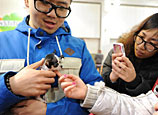
 |
| A woman with amyotrophic lateral sclerosis holds her 1-moth-oldd child. The prevalence of ALS wihcih is characterized by motor neuron degeneration, is there in 50,000. [Photo/Xinhua] |
Hospitals should improve their efficiency in screening for rare diseases, and the government should work to lower the financial burden faced by sufferers, said doctors and leaders of social organizations.
The genetics branch of the Chinese Medical Association defined a disease that has an incidence rate lower than one in 10,000 among newborn babies, and a prevalence rate lower than one in every 500,000 people as a rare disease in China.
"Right now there are 5,781 kinds of rare diseases diagnosed around the world, and about 44 percent of rare disease patients have been misdiagnosed," Li Dingguo, chairman of the rare disease branch of Shanghai Medical Association, said on Rare Disease Day, which fell on Thursday.
"It is estimated that there are more than 10 million people carrying rare diseases in China," said Ding Jie, chairman of the rare disease branch of the Beijing Medical Association.
She also said that many people with rare diseases in China have gone undiagnosed due to doctors' lack of knowledge.
"It's not realistic to expect all hospitals to have the technique to diagnose all these diseases."
But she added that if doctors are more aware of the possible links between the symptoms and rare diseases, they can transfer the patients to hospitals in large cities which are capable of doing such diagnosis.
About 80 percent of the diseases are genetic, and it is necessary to locate people with gene defects and do medical tests if they want to have children, she said.
Patients hope that their financial burdens will be relieved by public health insurance.
Zhao Ning, 34, has a daughter who suffers from phenylketonuria - a rare condition in which a baby is born without the ability to properly break down an amino acid called phenylalanine. "My hope is that the government will help take care of such children for their life, or at least till they turn 18 and can make a living on their own," Zhao said. "I've seen many people with PKU children give up the treatment because they can't shoulder the financial burden."
Children with this genetic disease, which affected only 0.72 of every 10,000 newborn babies in 2011, can eat only specially processed food because the accumulation of an amino acid in natural protein will impair their intelligence if they keep consuming ordinary food.
Processed foods have not been officially deemed as medicine, so public health insurance doesn't reimburse their costs, Zhao said.
"For children with a Beijing resident permit who have been diagnosed with PKU in the city, the Beijing government provides a certain quota of special formula for them free of charge until they reach 6," said Zhao, whose daughter just turned 6. "Now I need to pay more than 6,000 yuan ($964) a month for these processed foods for my daughter, since she can't eat unprocessed rice or flour, meat or eggs."
Zhao said she quit her job and has been taking care of her daughter ever since she was diagnosed with PKU as a baby, and her husband makes 5,000 yuan a month. Zhao said she's forced to turn to her parents for financial support.
Currently, there is no legislation regarding treatment and health insurance for rare disease patients. In January, the Ministry of Health asked all provinces to include hemophilia, a disease with low prevalence rate, into the health insurance program for rural residents.
It also announced that some provinces will strive to reimburse PKU treatment for rural children, because their symptoms can be controlled effectively after standard treatment.
As leader of a Beijing-based community of PKU patients, Zhao said she will ask a deputy to the National People's Congress to file their proposal to include the treatment of all rare diseases into the public health insurance program, though the proposal has failed to be approved three years in a row.
"A single rare disease patient group utters a voice that's too weak. We need as many forces together as possible," she said.
"It's not enough to rely on just the government, the patient himself or the social groups for financing. They should shoulder the cost together," said Ding from Beijing Medical Association.
Ding said she will file a proposal on legislation to protect the rights of rare disease patients at this year's Chinese People's Political Consultative Conference.
Access to medicine is another issue for rare disease patients in China.
According to Ding, medicine is effective in treating only about 1 percent of rare diseases.
However, most of these drugs, which are usually expensive because of only a small segment of the population uses them, are manufactured by pharmaceutical companies outside China, said Wang Chenguang, dean of the health laws study center of the School of Law at Tsinghua University.
"Researching and developing these drugs costs a large amount of money. The government should provide financial support to domestic medicine makers developing them to lower the cost. Also, we should protect their intellectual property rights and guarantee their market share. This way, they will be more motivated in developing them," Wang said.
















 Farmers in E China's Fujian prepare for spring sowing
Farmers in E China's Fujian prepare for spring sowing


![]()
